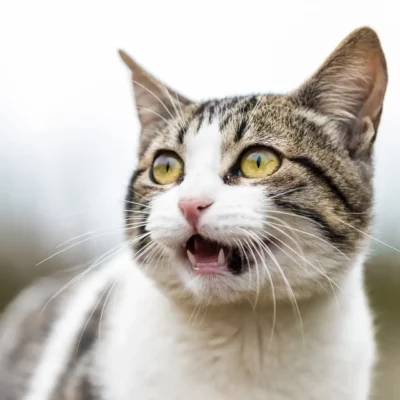The holiday season is a wonderful time filled with joy and cheer, but it’s important to remember that it can present some potential dangers for our beloved pets. While we decorate our homes and savor seasonal goodies, it’s crucial to remain vigilant about common holiday hazards that could harm our furry friends.
Read on as a local vet offers up some tips on how to keep your pets safe during the holiday season.
Toxic Holiday Plants
Many of us adorn our homes with festive plants during the holidays, but some of these can be harmful to pets. Mistletoe, holly, and poinsettias are examples of plants that can cause tummy troubles or more serious reactions if our pets decide to munch on them.
Electrical Cords
The twinkling lights and beautiful ornaments that deck our halls can make our homes look enchanting, but electrical cords can pose a real danger to pets who like to nibble on things. Chewing on cords can lead to electric shocks or burns, which makes them a big risk during this jolly season.
Holiday Treats
Partaking in yummy seasonal treats is a holiday tradition, but many of these foods can be harmful to our furry companions. Chocolate, often found in holiday desserts, is a clear example, as it contains substances that are toxic to pets.
Alcohol and Holiday Foods
As we celebrate with our loved ones, it’s crucial to keep an eye on our pets to ensure they don’t sneak any alcohol or gobble up foods that can be harmful to them. Alcohol can cause serious health issues for pets, and certain foods, like bones and fat trimmings, can lead to tummy troubles.
Open Flames and Candles
Candles add a cozy touch to holiday celebrations, but they also present a fire hazard for pets. Inquisitive animals could accidentally knock over candles, leading to burns or even a house fire. Making sure pets are supervised around open flames is really important for their safety during the festive season.
Things to Keep in Mind
While we’re immersed in the holiday festivities, it’s crucial to keep our furry pals safe. By being aware of common holiday hazards for pets, we can take steps to prevent accidents and create a happy and secure environment for both humans and animals.
Our Advice on Common Holiday Hazards for Pets in 2024
What specific symptoms should pet owners look out for if they suspect their pet has ingested a toxic holiday plant?
If a pet owner suspects their animal has ingested a toxic holiday plant, they should watch for symptoms such as vomiting, diarrhea, excessive drooling, or abdominal pain, which can indicate gastrointestinal distress. More severe signs include lethargy, difficulty breathing, or changes in heart rate. In cases involving mistletoe or holly ingestion, one might also observe tremors or seizures. Immediate veterinary consultation is crucial upon noticing these symptoms, as prompt treatment can be vital in managing potential toxicity and preventing more serious health issues.
What are some common holiday foods that are particularly dangerous for pets?
Common holiday foods that are dangerous for pets include chocolate, which contains theobromine and caffeine, both toxic to dogs and cats. Foods containing xylitol, an artificial sweetener found in many baked goods and candies, can cause severe issues like liver failure in pets. Onions, garlic, and grapes are also highly toxic and can lead to blood cell damage and kidney failure. Additionally, fatty foods like turkey skin and bones can cause pancreatitis and pose choking hazards, making them unsuitable for pet consumption.
What are the signs of alcohol poisoning in pets, and what should owners do if they suspect their pet has consumed alcohol?
Signs of alcohol poisoning in pets include vomiting, disorientation, excessive salivation, lethargy, and, in severe cases, seizures or respiratory failure. Pets may also exhibit a lack of coordination and abnormal behavior. If an owner suspects their pet has consumed alcohol, they should contact a veterinarian immediately or rush the pet to an emergency clinic. Do not wait for symptoms to worsen, as alcohol can be rapidly absorbed and highly toxic to pets. Prompt veterinary intervention is crucial to managing the toxicity and safeguarding the pet’s health.
How can pet owners create a designated safe space for their pets during holiday gatherings?
To create a designated safe space for pets during holiday gatherings, pet owners should choose a quiet room away from the main activity where the pet feels secure. This space should include the pet’s bed, favorite toys, and a fresh supply of water. Playing soothing music or using a white noise machine can help mask loud noises from the festivities. Ensure the room is escape-proof and check on the pet regularly to provide comfort and reassurance. This setup helps reduce stress and keeps the pet safe from hazards associated with gatherings.
How can pet owners manage their pet’s stress levels during the holidays?
To manage pets’ stress levels during the holidays, owners should maintain their routine as much as possible, including feeding and exercise schedules, to provide a sense of normalcy. Introducing pets to holiday decorations gradually and keeping them away from noisy festivities can prevent anxiety. Providing a quiet, safe space for the pet to retreat to during parties or when alone is crucial. Engaging in calming activities like gentle play or cuddles can also help soothe pets. Consider using pheromone diffusers or calming treats to further reduce stress.
And if you have more questions or wish to schedule your furry pal for a wellness checkup, please feel free to call us, your local vet clinic in Suwannee County, FL, anytime!



